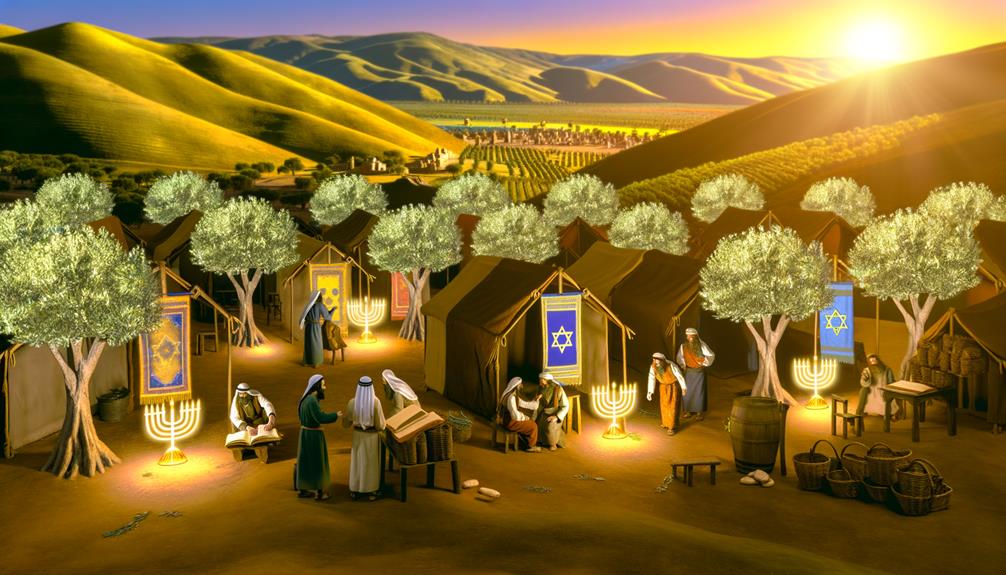Erin Meaning in Bible Verse: Peace and Promise
The name Erin, rooted in Irish mythology and etymologically derived from the Old Irish term “Éirinn,” does not explicitly appear in the Bible. Despite its absence, Erin holds symbolic significance that parallels biblical themes such as peace, renewal, and divine favor.
It embodies a spiritual journey and covenantal harmony, mirroring the biblical notion of the Promised Land. The phonetic similarity to “Aaron” and its cultural resonance offer nuanced insights into heritage and identity.
For those intrigued by the multifaceted connections between names and spiritual traditions, further exploration reveals richly layered meanings.

Erin Meaning in Bible: Spiritual Interpretation and Symbolism
| Aspect | Detailed Explanation |
|---|---|
| Name Origin | Erin originates from Irish Gaelic, meaning “peace” or “Ireland,” often symbolizing a place of sanctuary or harmony. |
| Biblical Connection | Although not directly mentioned in the Bible, Erin’s meaning aligns with biblical themes of peace, harmony, and God’s blessings. |
| Spiritual Insight | The name Erin can be seen as a representation of God’s peace and the promise of spiritual refuge and rest. |
| Symbolism | Symbolizes the ideal of living in alignment with divine peace, creating an atmosphere of spiritual stability and trust. |
| Practical Application | Encourages individuals with this name to embrace their role as peacemakers, reflecting God’s grace and love in their interactions. |
| Broader Implications | A reminder of the importance of seeking peace and fostering unity in alignment with biblical teachings. |
Origins of the Name Erin

The name Erin, though often associated with Ireland, has origins that trace back to ancient languages and cultural traditions. Erin is derived from the Irish word ‘Éirinn,’ which itself is a dative form of ‘Éire,’ the Irish name for Ireland.
This nomenclature holds significant historical and mythological connotations, particularly within Celtic traditions. The cultural significance of Erin extends beyond mere geographical identification; it embodies the essence of Irish identity, encapsulating centuries of folklore, national pride, and linguistic evolution.
Understanding the origins of Erin provides a nuanced appreciation of its depth and resonance, especially when examining its appearance in religious texts such as the Bible, where names often carry profound symbolic and historical implications.
Erin in Ancient Languages

Analyzing the name Erin through the lens of ancient languages reveals fascinating intersections with early Indo-European roots and semantic evolutions.
Erin, often associated with the Gaelic word ‘Éirinn,’ stems from ‘Éire,’ the Irish name for Ireland. This connects to the Proto-Celtic *īweriū, meaning ‘land of abundance.’ The semantic journey of Erin also links to the Old Irish term for ‘west,’ reflecting geographical orientation.
This etymological exploration evokes:
- A sense of historical depth: tracing the name back to ancient Celtic traditions.
- Cultural richness: encompassing the linguistic heritage of Ireland.
- Geographical significance: illustrating the interplay between language and landscape.
Understanding these linguistic layers adds profound dimensions to the name Erin, enriching its contextual and historical narrative.
Symbolic Significance of Erin

The symbolic significance of the name Erin, when examined through its biblical roots, reveals layers of cultural and theological implications embedded in ancient texts.
Within biblical theology, names often carry profound meanings that reflect divine attributes or historical narratives.
Erin’s Biblical Roots
Understanding Erin’s biblical roots requires delving into its etymological origins and exploring the cultural and religious contexts in which it appears.
The name Erin, though not directly mentioned in the Bible, is derived from the Irish word ‘Éirinn,’ meaning ‘Ireland.’ Symbolically, it represents:
- Heritage and Identity: Erin encapsulates a sense of belonging and cultural heritage deeply intertwined with Irish history and Christian influence.
- Spiritual Journey: The name evokes a pilgrimage-like path, reminiscent of the biblical Exodus, symbolizing spiritual growth and discovery.
- Divine Connection: Erin can also be seen as a metaphor for a land blessed and watched over by the Divine, much like the Promised Land in biblical narratives.
Such interpretations offer profound insights into the symbolic resonance of the name Erin.
Erin in Theology
Examining the symbolic significance of Erin within theological frameworks reveals its multifaceted role in representing spiritual identity, divine favor, and cultural heritage.
In religious contexts, Erin—often interpreted as ‘peace’ or ‘Ireland’—is imbued with profound theological implications. The notion of ‘peace’ aligns with biblical themes of divine tranquility and covenantal harmony, suggesting a state of spiritual well-being bestowed by God.
Additionally, Erin’s association with Ireland brings forth a rich cultural tapestry interwoven with Christian traditions and saintly legacies, particularly St. Patrick’s evangelistic mission.
This duality underscores Erin’s symbolic resonance as a bridge between divine providence and earthly heritage, reflecting a harmonious blend of faith, history, and cultural identity that enriches theological discourse.
Erin in Biblical Contexts

The exploration of Erin within biblical contexts necessitates an examination of its origins, particularly its etymological roots and historical significance.
Symbolism associated with Erin often reflects broader themes found in scripture, such as purity, promise, or divine favor.
Analyzing specific instances where Erin is referenced or alluded to in scripture can provide deeper insight into its theological and cultural implications.
Erin’s Biblical Origins
Although the name Erin does not directly appear in traditional biblical texts, its significance can be traced through its linguistic and cultural connections to ancient Hebrew and Irish traditions. The name Erin, derived from the Irish word ‘Éirinn,’ meaning ‘Ireland,’ evokes a sense of heritage and identity. In Hebrew, the name Erin is phonetically similar to ‘Aaron,’ a prominent biblical figure known for his role as a high priest.
The exploration of Erin’s origins reveals three emotional connections:
- Heritage: A link to Ireland’s ancient roots and traditions.
- Faith: Resonance with the Hebrew name Aaron, symbolizing priesthood and guidance.
- Identity: A name embodying cultural and spiritual significance across different traditions.
This multifaceted origin enriches the understanding of Erin’s name.
Symbolism of Erin
Drawing from its cultural and linguistic roots, the symbolism of Erin in biblical contexts can be intricately linked to themes of spiritual leadership, heritage, and identity. This name, carrying Celtic origins, resonates with a sense of profound connection to one’s ancestry and divine mission.
| Symbolism Aspect | Biblical Context | Cultural Significance |
|---|---|---|
| Spiritual Leadership | Servant of God | Guiding community in faith |
| Heritage | Lineage of Israel | Connection to forebears |
| Identity | Chosen People | Personal and collective identity |
In these contexts, Erin embodies a role that transcends mere nomenclature, symbolizing a bridge between human experience and divine intention. The name Erin serves as a touchstone for understanding one’s place within a larger, sacred narrative.
Erin in Scripture
Building on the rich symbolism associated with the name Erin, its presence in biblical contexts can be explored through various interpretations and scriptural references. Although the name Erin itself is not explicitly mentioned in the Bible, its meaning, often associated with ‘peace’ or ‘Ireland,’ aligns with several biblical themes.
- Peace and Harmony: Erin’s meaning of peace resonates with Jesus’ teachings in the New Covenant, emphasizing the importance of harmony and reconciliation.
- Land of Promise: If interpreting Erin as ‘Ireland,’ it can evoke the metaphorical Promised Land, a place of hope and divine fulfillment.
- Spiritual Identity: The name Erin can symbolize a journey toward self-discovery and spiritual alignment, mirroring the transformative paths of biblical figures.
These interpretations invite deeper reflection on Erin’s significance in a biblical framework.
Erin and Hebrew Traditions

In the context of Hebrew traditions, the name Erin is not derived from ancient Hebrew language or texts, but instead finds its roots in Gaelic culture, raising questions about its relevance and adaptation in biblical studies.
The Gaelic origin of Erin, meaning ‘peace’ or ‘Ireland,’ highlights a cultural divergence from Hebrew nomenclature. This divergence invites analysis of how names from different cultural backgrounds are integrated into biblical contexts.
While Erin’s etymology does not trace back to Hebrew origins, its adoption in modern Christian contexts suggests an evolving linguistic landscape.
Scholars must consider how such names, though not traditionally Hebrew, might find resonance or be repurposed within the framework of biblical and theological discourse, enhancing the multicultural understanding of scripture.
Erin in Christian Symbolism

One significant aspect of Erin in Christian symbolism is its association with themes of peace and renewal, reflecting the name’s Gaelic origins and its cultural integration into Christian narratives. This symbolic representation is evident in various scriptural and theological contexts, where Erin becomes a metaphor for God’s promise of restoration and tranquility.
Consider the following elements to understand its emotional and spiritual resonance:
- Hope: Erin embodies the hope for a renewed and harmonious future, mirroring biblical promises of a new Heaven and Earth.
- Redemption: The name signifies the redemptive journey that believers undertake, resonating with Christ’s promise of salvation.
- Serenity: Erin evokes a sense of inner peace, aligning with the Christian pursuit of spiritual calm and divine grace.
These elements deepen Erin’s meaning within Christian symbolism, offering a multifaceted understanding that enriches faith and devotion. The exploration of Erin within this context reveals connections to various scriptural themes, highlighting attributes such as redemption and grace. Additionally, the inclusion of Aziel biblical significance and meaning further amplifies these interpretations, providing a lens through which believers can view their own journeys of faith. Ultimately, these layers of symbolism invite a richer contemplation of personal devotion and spiritual growth.
Cultural Interpretations of Erin

Cultural interpretations of the name Erin reveal a rich tapestry of meanings and associations that vary considerably across different societies and historical periods. Originating from the Irish Gaelic term for Ireland, “Éirinn,” Erin has been adopted and adapted in diverse cultures. In the United States, it often symbolizes a sense of Irish heritage and identity. In the United Kingdom, the name is less tied to nationalistic sentiments but retains its cultural charm.
| Culture | Interpretation |
|---|---|
| Ireland | National identity, poetic name for Ireland |
| United States | Heritage and connection to Irish roots |
| United Kingdom | Cultural charm, less nationalistic |
| Australia | Popular given name, neutral connotations |
| Canada | Heritage and familial ties to Ireland |
Such variations underscore the name’s complex cultural resonance.
Erin in Spiritual Narratives

Exploring the spiritual dimensions of the name Erin reveals its layered significance in biblical and religious narratives. Although Erin is not explicitly mentioned in the Bible, its linguistic roots and cultural resonance imbue it with a rich tapestry of spiritual connotations.
Derived from the Irish word ‘Éirinn,’ meaning ‘Ireland,’ the name Erin symbolizes a land of promise and spiritual awakening.
Consider these profound aspects:
- Symbol of Renewal: Erin, representing Ireland, often evokes visions of verdant landscapes and new beginnings.
- Spiritual Connection: The name resonates with themes of divine providence and spiritual heritage.
- Cultural Legacy: Erin encapsulates a deep cultural and spiritual legacy, intertwining faith and identity.
Such interpretations highlight Erin’s enduring relevance in spiritual contexts.
Modern Reflections on Erin

In contemporary discourse, the name Erin continues to evoke nuanced reflections on identity, heritage, and spirituality, transcending its historical and cultural origins to resonate with modern sensibilities. As a name derived from the poetic term for Ireland, Erin signifies more than just a geographical connection; it embodies a sense of belonging, tradition, and a deep-rooted spiritual heritage. This modern reflection invites a broader contemplation on how names can encapsulate multi-faceted identities.
| Aspect | Modern Reflection |
|---|---|
| Identity | A connection to Irish heritage |
| Spirituality | Evokes a sense of ancient spiritual roots |
| Cultural Significance | Represents a bridge between past and present |
| Personal Meaning | Personalized interpretation in contemporary life |
Understanding Erin in today’s context enriches its timeless narrative.
Conclusion
The name Erin, though not explicitly mentioned in biblical texts, carries significant meanings through its origins and cultural interpretations.
From ancient languages to Hebrew traditions, Erin symbolizes peace and strength.
For example, consider a community leader named Erin who embodies these qualities, fostering unity and resilience among followers.
This analysis underscores the importance of understanding name symbolism in spiritual narratives, revealing how names can influence cultural and religious perceptions throughout history.






